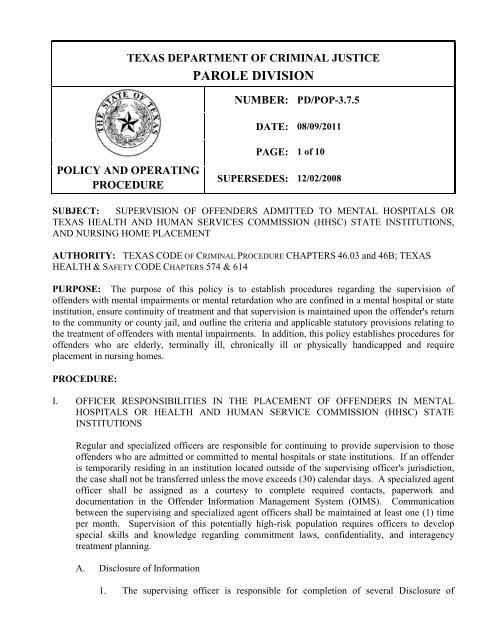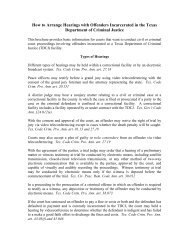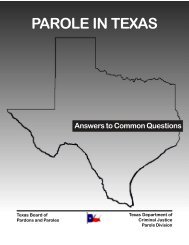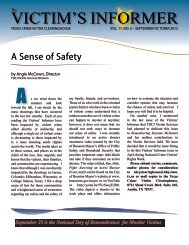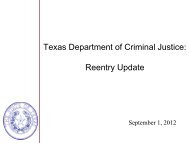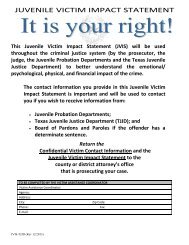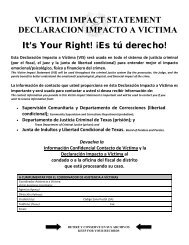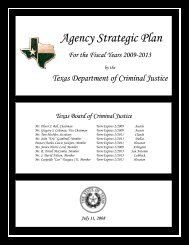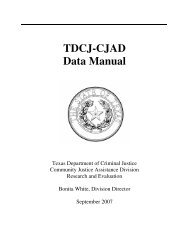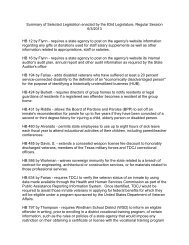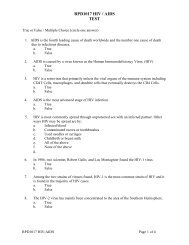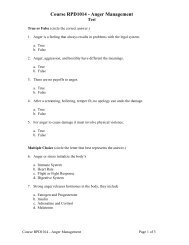PAROLE DIVISION - Texas Department of Criminal Justice
PAROLE DIVISION - Texas Department of Criminal Justice
PAROLE DIVISION - Texas Department of Criminal Justice
You also want an ePaper? Increase the reach of your titles
YUMPU automatically turns print PDFs into web optimized ePapers that Google loves.
TEXAS DEPARTMENT OF CRIMINAL JUSTICE<br />
<strong>PAROLE</strong> <strong>DIVISION</strong><br />
POLICY AND OPERATING<br />
PROCEDURE<br />
NUMBER: PD/POP-3.7.5<br />
DATE: 08/09/2011<br />
PAGE: 1 <strong>of</strong> 10<br />
SUPERSEDES: 12/02/2008<br />
SUBJECT: SUPERVISION OF OFFENDERS ADMITTED TO MENTAL HOSPITALS OR<br />
TEXAS HEALTH AND HUMAN SERVICES COMMISSION (HHSC) STATE INSTITUTIONS,<br />
AND NURSING HOME PLACEMENT<br />
AUTHORITY: TEXAS CODE OF CRIMINAL PROCEDURE CHAPTERS 46.03 and 46B; TEXAS<br />
HEALTH & SAFETY CODE CHAPTERS 574 & 614<br />
PURPOSE: The purpose <strong>of</strong> this policy is to establish procedures regarding the supervision <strong>of</strong><br />
<strong>of</strong>fenders with mental impairments or mental retardation who are confined in a mental hospital or state<br />
institution, ensure continuity <strong>of</strong> treatment and that supervision is maintained upon the <strong>of</strong>fender's return<br />
to the community or county jail, and outline the criteria and applicable statutory provisions relating to<br />
the treatment <strong>of</strong> <strong>of</strong>fenders with mental impairments. In addition, this policy establishes procedures for<br />
<strong>of</strong>fenders who are elderly, terminally ill, chronically ill or physically handicapped and require<br />
placement in nursing homes.<br />
PROCEDURE:<br />
I. OFFICER RESPONSIBILITIES IN THE PLACEMENT OF OFFENDERS IN MENTAL<br />
HOSPITALS OR HEALTH AND HUMAN SERVICE COMMISSION (HHSC) STATE<br />
INSTITUTIONS<br />
Regular and specialized <strong>of</strong>ficers are responsible for continuing to provide supervision to those<br />
<strong>of</strong>fenders who are admitted or committed to mental hospitals or state institutions. If an <strong>of</strong>fender<br />
is temporarily residing in an institution located outside <strong>of</strong> the supervising <strong>of</strong>ficer's jurisdiction,<br />
the case shall not be transferred unless the move exceeds (30) calendar days. A specialized agent<br />
<strong>of</strong>ficer shall be assigned as a courtesy to complete required contacts, paperwork and<br />
documentation in the Offender Information Management System (OIMS). Communication<br />
between the supervising and specialized agent <strong>of</strong>ficers shall be maintained at least one (1) time<br />
per month. Supervision <strong>of</strong> this potentially high-risk population requires <strong>of</strong>ficers to develop<br />
special skills and knowledge regarding commitment laws, confidentiality, and interagency<br />
treatment planning.<br />
A. Disclosure <strong>of</strong> Information<br />
1. The supervising <strong>of</strong>ficer is responsible for completion <strong>of</strong> several Disclosure <strong>of</strong>
Information and Waiver <strong>of</strong> Confidentiality (PMS-33) forms when <strong>of</strong>fenders are<br />
hospitalized locally for inpatient mental health services or incarcerated in the county<br />
jail pending civil or criminal mental health commitment.<br />
2. TEXAS HEALTH & SAFETY CODE § 614.017 allows identified state agencies, to<br />
disclose and receive confidential information relating to a convicted felon without a<br />
disclosure <strong>of</strong> information form if the purpose <strong>of</strong> the disclosure is to provide<br />
continuity <strong>of</strong> care to elderly <strong>of</strong>fenders and to <strong>of</strong>fenders with mental impairments,<br />
mental retardation, terminal or significant illness, or physical disabilities. The<br />
identified state agencies include: <strong>Texas</strong> Health and Human Services Commission<br />
(HHSC), through the <strong>Department</strong> <strong>of</strong> State and Health Services (DSHS), which<br />
includes Mental Health/Mental Retardation (MHMR) centers and the <strong>Department</strong> <strong>of</strong><br />
Aging and Disability Services (DADS). Despite this law, allowing disclosure, many<br />
treatment providers may require an <strong>of</strong>fender's consent prior to releasing confidential<br />
information. Parole <strong>of</strong>ficers shall obtain the <strong>of</strong>fender's signature on the PMS-33 to<br />
ensure open communication is maintained. However, information shall not be<br />
withheld if the <strong>of</strong>fender's signature has not been obtained.<br />
3. Human Immunodeficiency Virus (HIV) confidentiality is further protected by TEXAS<br />
HEALTH & SAFETY CODE ANN. § 85.115.<br />
4. The contact and documentation standards contained in this Parole Division policy<br />
require an <strong>of</strong>ficer to develop an ongoing relationship with clinical staff directly<br />
involved with an <strong>of</strong>fender's treatment. Pr<strong>of</strong>essional rules <strong>of</strong> confidentiality shall be<br />
maintained with treatment providers.<br />
5. Offenders shall sign the PMS-33 containing the name <strong>of</strong> each facility noted below:<br />
a. The local hospital, institution, or treatment facility where the <strong>of</strong>fender is<br />
receiving treatment.<br />
b. The state hospital, state institution, Veteran's Administration hospital, or any<br />
other facility to which the <strong>of</strong>fender may be committed or transferred.<br />
c. The local DADS or MHMR center.<br />
6. If, prior to signing the PMS-33, an <strong>of</strong>fender is transferred to a facility outside the<br />
supervising <strong>of</strong>ficer's jurisdiction, the following procedures shall be completed:<br />
a. Prepare and submit a Lotus Notes email requesting agent assistance from the<br />
District Parole Office (DPO) serving the area where the <strong>of</strong>fender is located.<br />
b. Attach a PMS-33 to the email, requesting that the <strong>of</strong>fender's signature be<br />
obtained on three (3) copies <strong>of</strong> the form.<br />
c. The agent <strong>of</strong>ficer shall forward two (2) <strong>of</strong> the fully executed PMS-33 forms to<br />
the supervising <strong>of</strong>ficer within five (5) business days <strong>of</strong> the <strong>of</strong>fender's transfer.<br />
One (1) PMS-33 form shall be provided to the <strong>of</strong>fender's assigned social<br />
worker or treatment team coordinator at the facility where the <strong>of</strong>fender is<br />
PD/POP-3.7.5 Page 2 <strong>of</strong> 10
housed.<br />
B. Case Status and Contact Requirements<br />
The following guidelines address the actions to be taken by <strong>of</strong>ficers with regard to<br />
admission <strong>of</strong> an <strong>of</strong>fender to a public or private mental hospital or state institution:<br />
1. Within seven (7) calendar days <strong>of</strong> being notified, the supervising <strong>of</strong>ficer shall<br />
establish contact with the <strong>of</strong>fender's assigned social worker or treatment team<br />
coordinator via telephone or in person. The <strong>of</strong>ficer shall furnish to the <strong>of</strong>fender's<br />
assigned social worker or treatment team coordinator a written statement containing<br />
the following information: the <strong>of</strong>ficer's name, <strong>of</strong>fice address and phone number, the<br />
<strong>of</strong>fender's name and status within the criminal justice system, and request that the<br />
<strong>of</strong>ficer be notified immediately in the event <strong>of</strong> the <strong>of</strong>fender's unauthorized departure<br />
or discharge from the facility. The <strong>of</strong>ficer shall provide the <strong>of</strong>fender’s assigned<br />
social worker or treatment team coordinator with one (1) <strong>of</strong> the original PMS-33<br />
forms authorizing the facility to release confidential information to the <strong>Texas</strong><br />
<strong>Department</strong> <strong>of</strong> <strong>Criminal</strong> <strong>Justice</strong>-Parole Division (TDCJ-PD).<br />
2. If the <strong>of</strong>fender is hospitalized in a facility, not in the County <strong>of</strong> Residence (COR) for<br />
more than thirty (30) consecutive days, the supervising <strong>of</strong>ficer shall submit an Etransmittal<br />
for Approved County <strong>of</strong> Residence (ACOR) change in OIMS. Upon<br />
approval <strong>of</strong> the ACOR transmittal the case shall be transferred to the new district<br />
parole <strong>of</strong>fice (DPO) through OIMS and a new supervising parole <strong>of</strong>ficer shall be<br />
assigned.<br />
3. The following contact standards shall be maintained throughout an <strong>of</strong>fender's<br />
hospitalization or institutionalization. Contacts shall be updated in OIMS within<br />
three (3) business days after contact or within three (3) business days after return to<br />
designated headquarters.<br />
a. The <strong>of</strong>ficer shall complete a minimum <strong>of</strong> one (1) face-to-face or telephone<br />
contact per month with the <strong>of</strong>fender. The <strong>of</strong>ficer shall coordinate each contact<br />
with facility staff.<br />
b. The <strong>of</strong>ficer shall complete a minimum <strong>of</strong> one (1) collateral contact with the<br />
<strong>of</strong>fender's social worker or treatment team coordinator per month. This contact<br />
may be accomplished in person or via telephone, and it may occur prior to or<br />
following the monthly contact with the <strong>of</strong>fender.<br />
c. The supervising parole <strong>of</strong>ficer shall conduct a minimum <strong>of</strong> one (1) telephone<br />
contact with the criminal court every thirty (30) calendar days for <strong>of</strong>fenders<br />
committed to a facility as a result <strong>of</strong> a criminal commitment (incompetent to<br />
stand trial). The <strong>of</strong>ficer shall ascertain, via this contact, the status <strong>of</strong> the<br />
pending charge(s) to include the court's intention regarding the possibility <strong>of</strong><br />
dismissing the pending charge(s). Documentation <strong>of</strong> each <strong>of</strong> these contacts<br />
shall be included in OIMS.<br />
d. Prior to the <strong>of</strong>fender's discharge or furlough, the <strong>of</strong>ficer shall contact the local<br />
PD/POP-3.7.5 Page 3 <strong>of</strong> 10
<strong>Texas</strong> Correctional Office on Offenders with Medical and Mental Impairments<br />
(TCOOMMI) Human Service Specialist (HSS) workers, DADS or MHMR<br />
center's continuity <strong>of</strong> care liaison to confirm the <strong>of</strong>fender's aftercare treatment<br />
plan and schedule <strong>of</strong> appointments. The <strong>of</strong>ficer shall provide the liaison with<br />
the PMS-33 authorizing the local DADS or MHMR center to release<br />
confidential information to the TDCJ-PD.<br />
e. Upon notification <strong>of</strong> the <strong>of</strong>fender's unauthorized departure from the facility,<br />
the <strong>of</strong>ficer shall attempt to ascertain the <strong>of</strong>fender's whereabouts and proceed<br />
with the revocation process in compliance with PD/POP-4.1.1 Processing<br />
Violations <strong>of</strong> the Rules and Conditions <strong>of</strong> Release.<br />
f. The <strong>of</strong>ficer shall document in OIMS all information regarding the <strong>of</strong>fender's<br />
progress, medication and treatment regimen, discharge plans, aftercare<br />
appointments, and other relevant data compiled during monthly contacts.<br />
C. Continuity <strong>of</strong> Treatment and Supervision<br />
Offenders with identified mental retardation or mental impairments require consistent<br />
supervision by <strong>of</strong>ficers who are familiar with the <strong>of</strong>fender’s history and current<br />
functioning. Effective supervision <strong>of</strong> this special population shall be coordinated with<br />
other agencies and service providers. Continuity <strong>of</strong> treatment and supervision is essential<br />
to <strong>of</strong>fenders with mental impairments who receive treatment in a mental hospital or state<br />
institution.<br />
The <strong>of</strong>ficer shall adhere to the following guidelines to ensure interagency collaboration and<br />
treatment planning:<br />
1. The <strong>of</strong>ficer shall share confidential information with service providers in order to<br />
provide continuity <strong>of</strong> care for <strong>of</strong>fenders with special needs. Pursuant to TEXAS<br />
HEALTH & SAFETY CODE § 614.017, such disclosure is allowed without the<br />
<strong>of</strong>fender's consent.<br />
2. Within 30 days <strong>of</strong> the <strong>of</strong>fender's discharge, the supervising <strong>of</strong>ficer shall request a<br />
copy <strong>of</strong> the <strong>of</strong>ficial medical records from the treating facility for inclusion in the<br />
<strong>of</strong>fender's parole file by sending a fully executed PMS-33 to the facility's medical<br />
records department. Additionally, the <strong>of</strong>ficer shall initiate the imposition <strong>of</strong><br />
appropriate special conditions relative to the <strong>of</strong>fender's ongoing treatment needs<br />
(e.g., medication compliance, DADS or MHMR treatment, alcohol abstinence,<br />
specialized caseload placement).<br />
3. The supervising <strong>of</strong>ficer shall contact the HSS worker assigned and the local DADS<br />
or MHMR center in person or via telephone a minimum <strong>of</strong> once a month to verify<br />
the <strong>of</strong>fender's compliance with aftercare treatment and document the contact in<br />
OIMS.<br />
4. The <strong>of</strong>ficer shall support and encourage the <strong>of</strong>fender's participation in the prescribed<br />
program <strong>of</strong> aftercare treatment and shall address treatment resistance or refusal in<br />
PD/POP-3.7.5 Page 4 <strong>of</strong> 10
accordance with PD/POP-4.1.1 Processing Violations <strong>of</strong> the Rules and Conditions <strong>of</strong><br />
Release.<br />
II. CRIMINAL COMMITMENT, CIVIL COMMITMENT, AND VOLUNTARY ADMISSION<br />
TO A MENTAL HOSPITAL OR STATE INSTITUTION<br />
Offenders with mental impairments may be admitted to mental hospitals or state institutions<br />
voluntarily or as a result <strong>of</strong> a criminal or civil commitment.<br />
A. <strong>Criminal</strong> Commitment<br />
1. Definition<br />
TEXAS CODE OF CRIMINAL PROCEDURE Chapter 46B relates to whether a criminal<br />
defendant possesses sufficient mental competency to stand trial with respect to the<br />
charged <strong>of</strong>fense(s). The statute further allows for the commitment to a mental<br />
institution <strong>of</strong> defendants found to be incompetent to stand trial but likely to regain<br />
competency in the foreseeable future. This type <strong>of</strong> commitment is commonly<br />
referred to as a criminal commitment.<br />
2. Potential for Release from Custody<br />
The following information is provided to assist <strong>of</strong>ficers responsible for supervising<br />
<strong>of</strong>fenders who are determined to be incompetent to stand trial but likely to regain<br />
competency. Officers shall utilize this information to determine an <strong>of</strong>fender's<br />
potential for release from custody while in this process.<br />
a. All criminal commitments are for a period not to exceed 18 months.<br />
b. The defendant's criminal charges remain pending during the court-ordered<br />
treatment. If the prosecutor chooses to dismiss the charges while the defendant<br />
is being treated, the facility shall discharge the defendant when notification <strong>of</strong><br />
dismissal is received from the court.<br />
c. If the incompetency is based on mental retardation, commitment to a<br />
maximum-security facility (Vernon State Hospital) <strong>of</strong> the HHSC system is<br />
required.<br />
d. If the incompetency is based on mental impairments and the pending charge is<br />
a misdemeanor, commitment to the HHSC facility (one <strong>of</strong> the 10 state<br />
hospitals or state centers) designated to serve the area in which the court is<br />
located is required.<br />
e. If the incompetency is based on mental impairments and the pending charge is<br />
a felony, commitment to an HHSC system maximum-security facility (Vernon<br />
State Hospital) is required.<br />
f. The facility providing treatment shall furnish a progress report to the court at<br />
PD/POP-3.7.5 Page 5 <strong>of</strong> 10
3. Return to Court<br />
least every 90 days.<br />
The defendant is always returned to the court for further proceedings when one <strong>of</strong><br />
the following occurs:<br />
a. Sufficient competency to stand trial has been attained;<br />
b. The facility determines there is no substantial probability that competency to<br />
stand trial will ever be attained in the foreseeable future;<br />
c. The 18-month commitment is about to expire.<br />
B. Civil Commitment<br />
1. Definition<br />
At this point, the court has several alternatives:<br />
(1) The court may resume criminal proceedings if the defendant is found to<br />
have attained competency.<br />
(2) The court must either release the defendant or proceed with pending<br />
Civil Commitment charges if the defendant is found incompetent to<br />
stand trial and the prosecutor has not dismissed the criminal charge(s).<br />
(3) The court must either release the defendant or proceed with dismissal <strong>of</strong><br />
the Civil Commitment charges if the defendant is found to be<br />
incompetent to stand trial and the prosecutor has dismissed the criminal<br />
charge(s).<br />
As noted, a civil commitment may be pursued after the issue <strong>of</strong> competency to stand<br />
trial has been appropriately addressed by the criminal court. Civil commitment may<br />
also take place following acquittal by reason <strong>of</strong> insanity.<br />
The TEXAS HEALTH AND SAFETY CODE Chapter 574 (commonly referred to as the<br />
<strong>Texas</strong> Mental Health Code) is the law set forth to provide "access to humane care<br />
and treatment for all persons who suffer from severe mental illness." The court with<br />
probate jurisdiction in a county resides over matters arising under the Mental Health<br />
Code.<br />
2. Criteria for Inpatient or Outpatient Treatment<br />
Most commonly, the civil mental health commitment process is utilized to allow a<br />
court to order an individual to submit to inpatient or outpatient treatment when, as a<br />
result <strong>of</strong> mental illness, the person is:<br />
a. Likely to cause serious harm to self;<br />
PD/POP-3.7.5 Page 6 <strong>of</strong> 10
. Likely to cause serious harm to others;<br />
c. Likely to continue to suffer severe and abnormal mental, emotional, or<br />
physical distress if not treated;<br />
d. Unable to make a rational and informed decision as to whether to submit to<br />
treatment.<br />
Although the <strong>Texas</strong> Mental Health Code seeks to define clearly the commitment<br />
criteria, it is subject to the interpretation <strong>of</strong> individual judges, physicians, attorneys,<br />
and peace <strong>of</strong>ficers. As a result, the application <strong>of</strong> the Mental Health Code may vary<br />
dramatically in different counties.<br />
3. Types <strong>of</strong> Inpatient Commitments<br />
The <strong>Texas</strong> Mental Health Code contains provisions for two (2) types <strong>of</strong> inpatient<br />
commitments, as outlined below:<br />
a. Temporary Mental Health Services – not to exceed 90 days<br />
b. Extended Mental Health Services – not to exceed 12 months. (The individual<br />
shall have received inpatient court-ordered services for at least 60 consecutive<br />
days during the previous 12 months and the condition described must be<br />
expected to continue for more than 90 days.)<br />
4. Facility Release<br />
An <strong>of</strong>fender may be discharged or furloughed from a facility prior to the expiration<br />
<strong>of</strong> the court-ordered commitment. Discharge effectively terminates the court order<br />
for mental health services. Furlough from a facility is a status similar to parole.<br />
Generally, a furlough is for a specific length <strong>of</strong> time (usually 30 days) and contains<br />
provisions regarding compliance with aftercare treatment. The furlough may be<br />
revoked by the facility if the individual does not comply with outpatient treatment.<br />
C. Voluntary Admission<br />
1. Admission Criteria<br />
Some facilities have an internal policy restricting the acceptance <strong>of</strong> involuntary<br />
patients. An <strong>of</strong>fender may be admitted voluntarily to a public or private institution as<br />
long as the facility staff determines the following conditions are met:<br />
a. The <strong>of</strong>fender will benefit from services;<br />
b. The <strong>of</strong>fender is likely to be mentally ill;<br />
c. A bed is available.<br />
PD/POP-3.7.5 Page 7 <strong>of</strong> 10
Occasionally, a state hospital will continue to provide inpatient treatment to an<br />
<strong>of</strong>fender after the expiration <strong>of</strong> the <strong>of</strong>fender’s commitment for temporary mental<br />
health services. This treatment would also be considered voluntary.<br />
2. Discharge<br />
Once a patient formally requests release, the hospital or institution has 96 hours (four<br />
days) to affect the release or to begin the process <strong>of</strong> seeking court-ordered mental<br />
health services. Other facilities may be reluctant to initiate mental health<br />
commitment proceedings when a voluntary patient requests a discharge.<br />
Consequently, a voluntary patient who persists in requesting discharge may be<br />
discharged by the facility. This type <strong>of</strong> discharge is <strong>of</strong>ten classified as “against<br />
medical advice.”<br />
III. NURSING HOME PLACEMENT<br />
A. Offenders on parole or mandatory supervision who are in need <strong>of</strong> skilled nursing care may<br />
be placed in a nursing home upon release from the TDCJ-Correctional Institutions<br />
Division (TDCJ-CID), Intermediate Sanction Facility (ISF), Substance Abuse Felony<br />
Punishment Facility (SAFPF), or from the field if medical eligibility requirements are met.<br />
1. TDCJ-CID placement<br />
a. The Huntsville Placement & Release Unit (HPRU)-Huntsville notifies the<br />
<strong>Texas</strong> Correctional Office on Offenders with Medical or Mental Impairments<br />
(TCOOMMI) Program Specialist, Huntsville, <strong>of</strong> <strong>of</strong>fenders eligible for parole<br />
or mandatory supervision who may be in need <strong>of</strong> a nursing home placement.<br />
TCOOMMI coordinates determination <strong>of</strong> medical eligibility with the nursing<br />
home.<br />
b. If the <strong>of</strong>fender is determined to be medically eligible for nursing home<br />
placement, TCOOMMI (Huntsville) notifies the HPRU, Review & Release<br />
Processing-Huntsville, and the district parole <strong>of</strong>fice (DPO) where the <strong>of</strong>fender<br />
will be reporting.<br />
c. TCOOMMI arranges transportation for the <strong>of</strong>fender to the nursing home and<br />
advises the local DPO <strong>of</strong> the release date and transportation arrangements.<br />
d. Offenders released on Medically Recommended Intensive Supervision (MRIS)<br />
who need skilled nursing care are placed at an approved nursing home.<br />
e. The <strong>of</strong>fender shall be placed on the Special Needs Offender Program (SNOP)<br />
caseload and the SNOP <strong>of</strong>ficer shall complete a PMS-33 for the <strong>of</strong>fender to<br />
sign.<br />
2. ISF or SAFPF Placement<br />
a. In the event that an <strong>of</strong>fender in need <strong>of</strong> skilled nursing care is scheduled for<br />
PD/POP-3.7.5 Page 8 <strong>of</strong> 10
elease from ISF or SAFPF, Central Coordination Unit (CCU) is responsible<br />
for placing that <strong>of</strong>fender in a nursing home. CCU shall contact TCOOMMI<br />
(Austin) to initiate the process <strong>of</strong> determining medical eligibility for placement<br />
in a nursing home.<br />
b. If eligibility has been determined for placement in a nursing home, TDCJ-PD<br />
is responsible for transportation arrangements once the <strong>of</strong>fender is placed.<br />
Transportation arrangements include the following: the parole <strong>of</strong>ficer shall<br />
contact the <strong>of</strong>fender's family/sponsor and the receiving nursing home in an<br />
attempt to coordinate transportation. If transportation cannot be coordinated,<br />
TDCJ-PD is responsible for the transportation arrangements, to include<br />
expenses. TCOOMMI (Austin) shall provide technical assistance when<br />
necessary.<br />
c. The <strong>of</strong>fender shall be placed on the SNOP caseload and the SNOP <strong>of</strong>ficer shall<br />
complete a PMS-33 and obtain <strong>of</strong>fender's signature.<br />
3. Field Placement<br />
a. The following procedures shall occur prior to an <strong>of</strong>fender being placed in a<br />
DADS approved nursing home facility:<br />
(1) The parole <strong>of</strong>ficer submits an inter<strong>of</strong>fice memorandum by fax or email to<br />
TCOOMMI (Austin) which shall include medical diagnosis and any<br />
available medical records to be utilized in determining nursing home<br />
eligibility. If nursing home eligibility is determined, TCOOMMI<br />
(Austin) shall initiate the placement at the nursing home. If the <strong>of</strong>fender<br />
is determined to be ineligible for nursing home placement, the parole<br />
<strong>of</strong>ficer shall submit a Halfway House Placement request (RRC-10) to the<br />
HPRU, according to established TDCJ-PD procedures, if necessary.<br />
(2) TCOOMMI (Austin) shall notify the supervising parole <strong>of</strong>ficer <strong>of</strong> the<br />
nursing home placement. The supervising <strong>of</strong>ficer shall utilize the<br />
transfer process, if applicable, according to TDCJ-PD procedures.<br />
Transportation arrangements include the following: the parole <strong>of</strong>ficer<br />
shall attempt contact with the <strong>of</strong>fender's family/sponsor and the receiving<br />
nursing home in an attempt to coordinate transportation. If transportation<br />
cannot be coordinated, TDCJ-PD is responsible for the transportation<br />
arrangements, to include expenses. TCOOMMI (Austin) shall provide<br />
technical assistance when necessary.<br />
(3) The <strong>of</strong>fender shall be placed on the SNOP caseload and the SNOP<br />
<strong>of</strong>ficer shall complete a PMS-33 and obtain <strong>of</strong>fender signature.<br />
b. Offender's Termination Notice (30 day notice)<br />
(1) The behavior <strong>of</strong> the <strong>of</strong>fender may result in the <strong>of</strong>fender receiving a (30)<br />
day termination notice. The parole <strong>of</strong>ficer and unit supervisor shall<br />
contact the nursing home administration and the <strong>of</strong>fender, within 2<br />
PD/POP-3.7.5 Page 9 <strong>of</strong> 10
usiness days, upon receipt <strong>of</strong> the notification, to verify whether or not<br />
additional interventions with the <strong>of</strong>fender can rectify the problem.<br />
(2) If the nursing home administration maintains the <strong>of</strong>fender termination<br />
from the nursing home, TCCOOMMI (Austin) will assist in obtaining<br />
alternative nursing home placement.<br />
(3) TCOOMMI (Austin) shall notify the supervising <strong>of</strong>ficer <strong>of</strong> the nursing<br />
home placement. The <strong>of</strong>ficer shall utilize the transfer process, if<br />
applicable, according to TDCJ-PD procedures. Transportation<br />
arrangements include the following: the parole <strong>of</strong>ficer shall attempt<br />
contact with the <strong>of</strong>fender's family/sponsor and the receiving nursing<br />
home in an attempt to coordinate transportation. If transportation cannot<br />
be coordinated, TDCJ-PD is responsible for the transportation<br />
arrangements, to include expenses. TCOOMMI (Austin) shall provide<br />
technical assistance when necessary.<br />
B. RELEASE FROM THE NURSING HOME<br />
1. If the <strong>of</strong>fender is to be transferred to another nursing home at the <strong>of</strong>fender or the<br />
<strong>of</strong>fender's family/sponsor request, the <strong>of</strong>fender or his family/sponsor shall be<br />
responsible for finding a satisfactory alternative placement for the <strong>of</strong>fender and<br />
coordinating communication between the involved facilities. TCOOMMI (Austin)<br />
will provide technical assistance to the family/sponsor.<br />
2. If the <strong>of</strong>fender is to be transferred to a home placement, it is the responsibility <strong>of</strong> the<br />
<strong>of</strong>fender or the <strong>of</strong>fender’s family/sponsor to inform the parole <strong>of</strong>ficer <strong>of</strong> the proposed<br />
home plan and what medical care has been arranged.<br />
3. Upon receipt <strong>of</strong> the proposed placement plan, the parole <strong>of</strong>ficer shall initiate the<br />
transfer process in accordance with PD/POP-3.2.17 Transfer Investigation.<br />
a. Once the transfer is approved, it is the responsibility <strong>of</strong> the <strong>of</strong>fender or his<br />
family/sponsor to arrange transportation to the new facility or home placement.<br />
b. The parole <strong>of</strong>ficer shall transfer the case file to the receiving <strong>of</strong>ficer according<br />
to established Parole Division procedures and shall notify TCOOMMI (Austin)<br />
<strong>of</strong> the transfer and new placement plan.<br />
c. TCOOMMI (Austin) shall notify contract staff <strong>of</strong> the new placement plan.<br />
________________________________<br />
Stuart Jenkins<br />
Director, Parole Division<br />
PD/POP-3.7.5 Page 10 <strong>of</strong> 10


